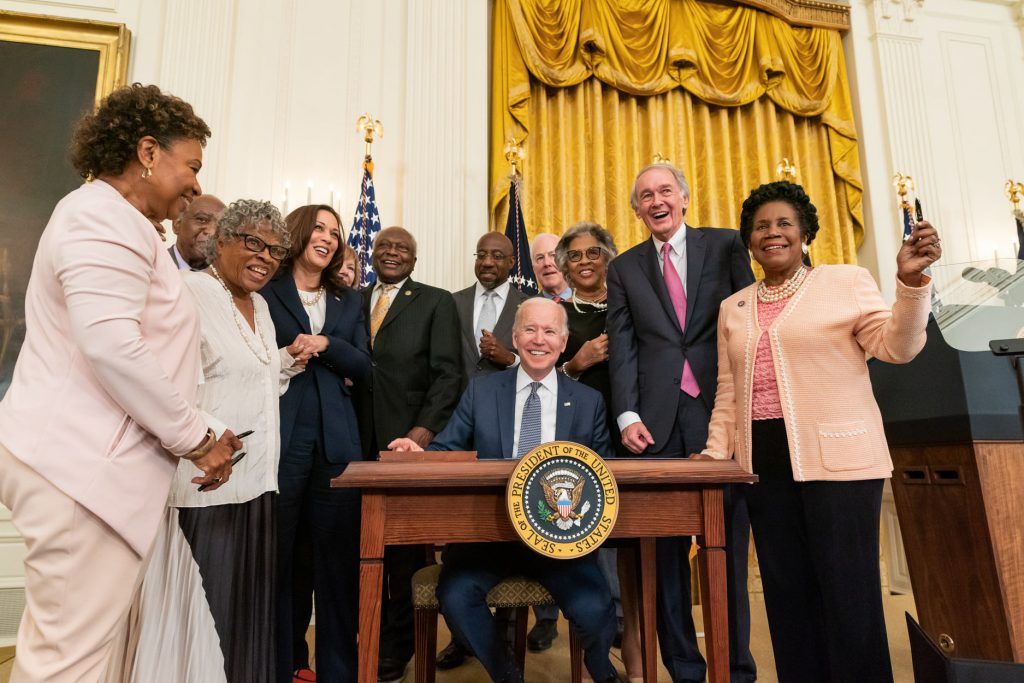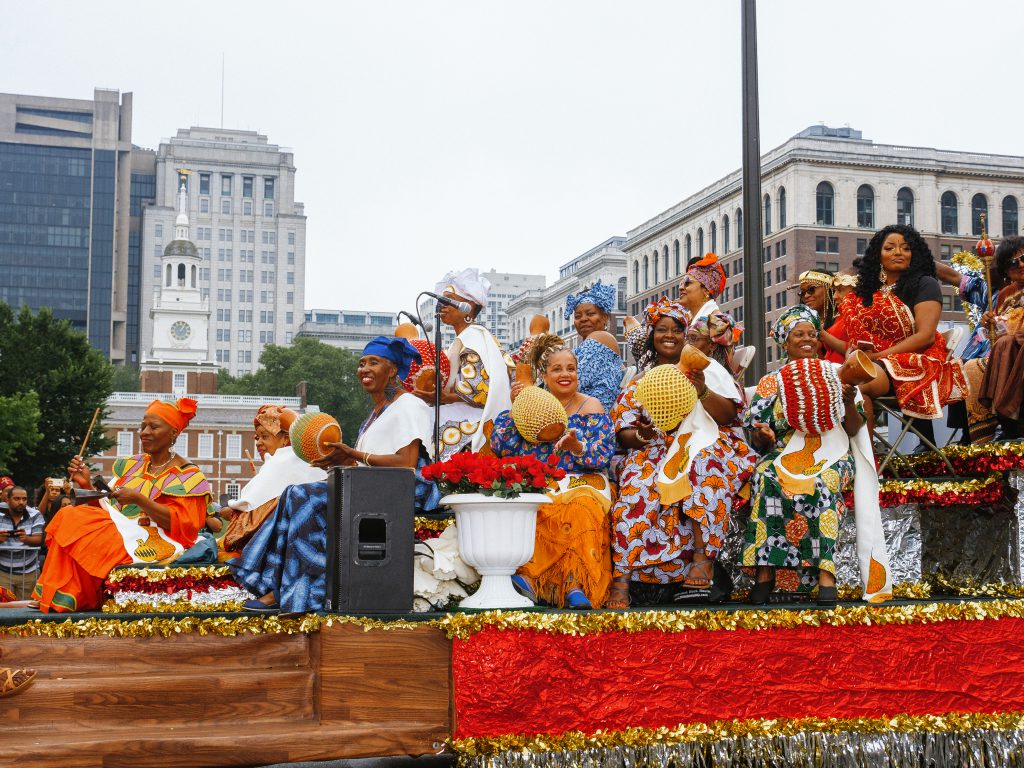A celebration of freedom suitable for everyone

President Joe Biden, joined by Vice President Kamala Harris, lawmakers and guests, signs the Juneteenth National Independence Day Act Bill on June 17, 2021, in the East Room of the White House. (Official White House photo by Chandler West)
By Irshad Abdal-Haqq
January/February 2022
Something phenomenal has occurred since last year’s observance of Black History Month. For the first time in nearly 40 years, a new national holiday was established when Congress passed the Juneteenth National Independence Day Act on June 17, 2021.
Juneteenth, called “a day of profound weight and power” by President Joe Biden, has been a longstanding holiday for celebrating freedom and equality for the nation’s African American descendants of slavery. Now it has become a day of observance for all Americans, regardless of ethnicity, race or religion. For Muslim Americans living in the post-9/11 U.S., embracing symbols of freedom and equality has never been more culturally relevant.
Historical Overview
Upon signing this act into law, Biden immediately ordered all federal offices to close the following workday to commemorate an event that occurred in Galveston, Texas, on June 19, 1865: U.S. Army Major General Gordon Granger publicly read his military directive entitled “General Order No. 3,” informing those in attendance that Abraham Lincoln had abolished slavery years earlier. The relevant part states:
The people of Texas are informed that, in accordance with a proclamation from the Executive of the United States, all slaves are free. This involves an absolute equality of personal rights and rights of property, between former masters and slaves and the connection heretofore existing between them, becomes that between employer and hired labour. (https://www.archives.gov/news/articles/juneteenth-original-document).
He announced this act more than 2½ years after the Emancipation Proclamation, which had declared, as of January 1, 1863, the freedom of all slaves in states “in rebellion against the United States.” Texas was one such state.
This significant delay is attributed to the fact that there was no way of enforcing Lincoln’s proclamation any earlier. Therefore, the slaveholders ignored it, even though the Confederacy had formally surrendered at Appomattox, Va., on April 9, 1865. It took years for Granger’s troops to reach Texas. But even after his general order, slavery didn’t end immediately throughout Texas and its eventual statewide enforcement didn’t end slavery nationwide.
Many Texas slaveholders beyond Galveston withheld word of it until the end of the 1865 harvest season. Slavery within non-rebelling states and Indian tribes was only abolished months later. In some cases, it persisted until the Thirteenth Amendment, ratified on Dec. 6, 1865, abolished it nationwide.
In this respect, Granger’s Galveston directive should be regarded more as a symbol of freedom and abolition in that Texas was the last Confederate state to enforce the Emancipation Proclamation.

Philadelphia’s all-inclusive 2018 Juneteenth celebration featured this Commission on African & Caribbean Immigrant Affairs parade float. (© Visit Philadelphia. Photo by A. Ricketts. Published with permission granted to the author by Rob Rabena, director of video & photography, Visit Philadelphia). https://www.visitphilly.com/juneteenth-in-greater-philadelphia/
Celebrating Freedom
Soon after Granger issued his general order, Galveston’s ex-slaves or “freedmen” celebrated their freedom. In 1866, they organized the first of what would become the now-annual Juneteenth Day celebrations. But other groups celebrated their own freedom as well. Though not always using “Juneteenth” — a blend of “June” and “nineteenth” — many African American communities across the U.S. (especially in the South) and even in northern Mexico, to which thousands of slaves had fled, have long celebrated their emancipation in one form or another.
Sometimes called “Freedom Day,” “Jubilee Day” or “Emancipation Day,” versions of Juneteenth have been observed for many decades, though not always consistently. Oppressive racist laws (Jim Crow) prohibited large African American gatherings; oppressive working conditions and abject poverty (the Great Depression) prohibited time and resources for celebrations, and mass internal migration to northern industrial cities (the Great Migration) effectively snuffed out this and many other rural southern rituals and traditions.
In recent decades, however, many African Americans have rediscovered and embraced these cultural traditions and petitioned state and local governments to do the same. Juneteenth became an official Texas holiday in 1980. Since then, 45 other states and the District of Columbia have followed suit (https://crsreports.congress.gov, the “Juneteenth Fact Sheet,” report R44865). But it took a sustained decades-long effort by Opal Lee, popularly known as the “Grandmother of Juneteenth,” and numerous other activists to get it recognized as an official federal holiday.
It is worth noting, however, that an often-vocal minority of African Americans reject this celebration on the grounds that it rings hollow until the government formally apologizes for slavery, segregation and other racist legacies and commits to providing reparations.
Significantly, prior to adopting Juneteenth Day, the last federal holiday established by Congress occurred in 1983: Dr Martin Luther King, Jr. Day, to honour the assassinated civil rights activist. His focus on serving others was so profound that this holiday has been enshrined as “A Day of Service,” on which millions of Americans engage in community service projects.
Similarly, Juneteenth promises to epitomize a day upon which all Americans can celebrate freedom. And what two concepts of human purpose are more representative of Islam’s mission than service and freedom?
For example, one hadith equates serving others with serving God (“Forty Hadith Qudsi: Selected and Translated by Ezzeddin Ibrahim and Denys Johnson-Davis,” Hadith 18 [1980]) and Quran 90:1-20, which oblige us to free bondsmen (slaves) and feed the indigent and orphans if we want to save our souls (“Al-Balad” and accompanying footnotes). Based on such inspired guidance, Muslim Americans should be more amenable to embracing the spirit of Juneteenth as an extension of its own purpose and mission than any other American community.
Perhaps one of the most vocal proponents in this regard was the late imam W. Deen Mohammed (d.2008). As early as 1992, he encouraged his predominately African American association to embrace it as a day for celebrating the excellence of people of African descent and as an opportunity to focus on the future, rather than dwelling on the past.
Black History Month is celebrated each February. This month was initially chosen because it coincided with Abraham Lincoln’s birthday (Feb. 12) and Frederick Douglass (d. Feb. 20, 1895), a slave who escaped from Maryland and became a national leader of the abolitionist movement on Feb. 14.
Black communities had celebrated both dates together since the late-19th century. Imam W. Deen Mohammed argued that the date focuses on the past, but that on Juneteenth Day the focus should be on the future. “We want more emphasis on the future than we want on the past or present,” he said. “Our religion tells us, Al-Islam tells us, dear people, Al-Islam tells us to live with a view on the future. That’s why it says that destiny is more important than the now” (“Imam W. Deen Mohammed Speaks-Juneteenth,” Muslim Journal, July 9, 2021, p.15).
Other African American Muslims have also expressed support for observing Juneteenth Day. For example, Sapelo Square (sapelosquare.com), an online platform focused on the Black Muslim experience in America, tweeted support for the observance. Blogger and advocate for African American rights, Jummanah Abu Samra, aka “Muslim Girl,” endorsed the holiday as a further step toward reparations. Blavity contributor, aamalhi16, citing Surah 90, embraced Juneteenth and the abolition of slavery as morally elevating for the entire nation.
Beyond African American Muslim involvement and support, Muslim Americans can participate in a plethora of Juneteenth activities. For example, last year CAIR hosted an online screening of a film exploring Muslim American reflections on racial injustice. Islamic Relief USA, Sound Vision, Muslim Advocates, KARAMAH, and other American Muslim organizations also expressed support for or hosted Juneteenth activities.
Similarly, last year the New York Times hosted an online Juneteenth program that included a podcast interview of historian, Dr Daina Ramey Berry, and a range of other activities. And of course, everyone can participate in festivities planned for their local area. Municipal governments and visitor centres typically provide links to such opportunities.
Perhaps the largest and most inclusive Juneteenth program occurs annually in Greater Philadelphia, which includes both African and Caribbean immigrants. In 2021 it was held from June 19 until July 4 and featured numerous parades, musical performances, festivals and other activities. In past years, community activists Luqman Abdul Haqq (aka Kenny Gamble), Dolores Lami Mohammed and Ali Salahuddin were instrumental in its production. For details, visit https://www.visitphilly.com/ and http://JuneteenthPhilly.org.
For American Muslims, Juneteenth provides an opportunity to understand our country’s past more fully, and, in turn, honour the virtues of freedom and equality that we are obligated to pursue ourselves and others.
Irshad Abdal-Haqq, the author of “Dash! Young Black Refugee and Migration Stories” (2020), writes intercultural fiction and nonfiction. Learn more at Abdal-Haqq.com.